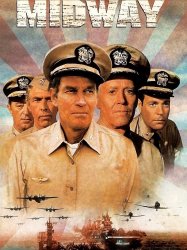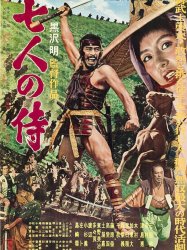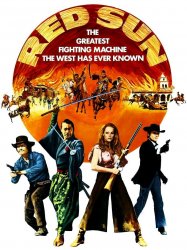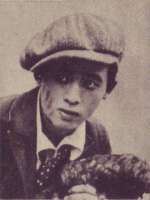Toshiro Mifune is a Actor, Director and Producer Japonais born on 2 april 1920 at Qingdao (Chine)
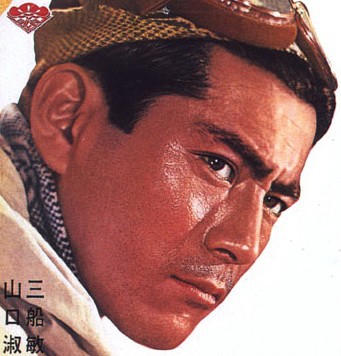
Toshiro Mifune (三船 敏郎, Mifune Toshirō, April 1, 1920 – December 24, 1997) was a Japanese actor who appeared in almost 170 feature films. He is best known for his 16-film collaboration (1948–65) with filmmaker Akira Kurosawa in such works as Rashomon, Seven Samurai, Throne of Blood, and Yojimbo. He also portrayed Musashi Miyamoto in Hiroshi Inagaki's Samurai Trilogy, as well as Lord Toranaga in the NBC TV miniseries Shōgun.
Mifune naît le 1er avril 1920 à Tsingtao en Chine de parents japonais, et grandit à Dalian avec un frère et une sœur. Dans sa jeunesse, il travaille dans le magasin de photographie de son père Tokuzo, un méthodiste et probablement aussi un missionnaire, prêchant auprès de la communauté japonaise de Dalian.
Bien qu'il ait passé les dix-neuf premières années de sa vie en Chine et qu'il parle couramment le mandarin, c'est en tant que citoyen japonais qu'il est enrôlé dans la Force Aérienne Impériale japonaise où il travaille comme photographe aérien durant la Seconde Guerre mondiale.
Début de carrière
Il retourne au Japon en 1946, au lendemain de la guerre, et s'y retrouve seul, sans parents, il cherche un travail dans la photographie.
En 1947, l'un de ses amis qui travaille au service photographique chez Tōhō lui trouve un poste comme assistant de prises de vues. Cependant, la société est à l'époque liée au parti communiste, ce qui ne réconforte guère Mifune, plutôt religieux et conservateur.
Suite à une grève prolongée, un grand nombre d'acteurs quittent Tōhō afin de créer leur propre compagnie : la Shin Tōhō. Aussitôt, le studio organise un concours afin de découvrir de nouveaux talents. Des amis de Mifune le font participer à son insu, et il est pris avec quarante-huit autres (sur quatre mille postulants) afin de faire un bout d'essai pour Kajiro Yamamoto. À l'audition, lorsqu'on lui demande de mimer la colère, il puise dans son passé militaire et semble si convaincant que les examinateurs l'éliminent, craignant qu'il soit une personne trop arrogante et pénible. Par chance, Kajiro Yamamoto apprécie sa performance et le conseille à son collègue Sankichi Taniguchi qui lui offre son premier rôle dans Shin baka jidai en 1947.
Mariage
L'une des partenaires de Mifune, une des trente-deux femmes sélectionnées durant le concours de Tōhō, s'appelle Sachiko Yoshimine. De huit ans sa cadette, elle vient d'une famille aisée de Tokyo. Ils tombent amoureux et Mifune la demande bientôt en mariage.
Mais les parents de Yoshimine s'opposent au mariage avec Mifune qui n'est pas bouddhiste, qui est originaire de Mandchourie (une région considérée alors par les Japonais comme un repaire de crapules), et dont la profession n'est pas un gage de stabilité ni de responsabilité.
Le réalisateur Senkichi Taniguchi, avec l'aide d'Akira Kurosawa, parvient à convaincre la famille d'autoriser le mariage. Celui-ci a lieu en février 1950. En novembre de la même année, leur premier fils Shirō vient au monde. En 1955 ils ont un second fils, Takeshi, puis en 1961 une fille, Mika.
Célébrité
Sa stature imposante, sa panoplie d'acteur, son aisance avec les langues étrangères et sa longue collaboration avec le célèbre réalisateur Akira Kurosawa en font l'acteur japonais le plus célèbre à l'époque, et certainement le plus connu dans le monde occidental. Il joue souvent le rôle d'un samouraï ou d'un rōnin, souvent grossier et bourru, allant à l'encontre de l'image traditionnelle de ces personnages. Il maîtrisait le sabre à haut niveau et obtint le 7e dan en kendo et membre éminent du kôryû Takeda, école d'arts martiaux japonais traditionnels. Dans des films comme Les Sept Samouraïs et Yojimbo, son personnage manque de bonnes manières mais ses qualités sont ailleurs, dans sa sagesse, son expérience, ou encore sa prouesse au combat. Dans Sanjuro, son efficacité sans fioriture contraste avec l'aspect soigné des samouraïs de la Cour. Kurosawa apprécie beaucoup l'émotion toute simple qui se dégage de son acteur, là où n'importe quel autre comédien en aurait fait des tonnes.
Mifune est également reconnu pour son sens de l'humour (il n'hésite pas à se tourner en dérision dans ses propres films), mais aussi pour l'importance qu'il attache à chacun de ses rôles. Ainsi, pour préparer Les Sept Samouraïs et Rashōmon, il étudie, sur film, des combats de lions dans la brousse ; pour Ánimas Trujano, il regarde des films d'acteurs mexicains afin de pouvoir prononcer correctement ses répliques en espagnol. Dans ses premiers films en anglais (Grand Prix en 1966…) il apprend ses répliques phonétiquement et le résultat n'est pas toujours probant, sa voix devant alors être doublée par Paul Frees. Mais il s'améliore au fil des ans et, en 1971, c'est sa propre voix que l'on entend tout au long du film Soleil rouge, un western au casting international. Il regretta toujours de ne pas avoir une carrière plus prolifique en Occident. Son rôle anglais le plus mémorable est certainement celui de l'amiral Isoroku Yamamoto dans La Bataille de Midway (1976).
Il est un moment envisagé pour le rôle d'Obi-Wan Kenobi par George Lucas alors que celui-ci prépare Star Wars, épisode IV : Un nouvel espoir, ayant déjà joué un rôle analogue (le général Rokurota) dans La Forteresse cachée (1958), un film dont l'influence se fait ressentir dans le film de George Lucas.
On lui doit l'archétype du « guerrier vagabond » qu'il a souvent interprété chez Kurosawa. Ce personnage sera notamment repris par Clint Eastwood dans ses westerns, ainsi que dans les westerns spaghettis de Sergio Leone. Pour une poignée de dollars est un remake intégral et inavoué de Yojimbo, ce qui d'ailleurs ne plut guère à Kurosawa.
La plupart des seize films rassemblant Kurosawa et Mifune sont aujourd'hui devenus des classiques : Rashōmon, Le Chien enragé, Les Sept Samouraïs, La Forteresse cachée, Le Château de l'araignée (une adaptation du Macbeth de Shakespeare), Yojimbo, Sanjuro…
Mifune et Kurosawa se séparent après Barberousse (1965). Ayant laissé pousser sa barbe et devant la conserver intacte durant les deux ans du tournage, Mifune ne peut tourner dans aucun autre film, ce qui met l'acteur et sa société de production en difficulté financière. Heureusement le film fait un triomphe au Japon et marche bien en Europe, mais pas aux États-Unis.
Dernières années
Dans un sondage réalisé par un magazine en 1984, Mifune est reconnu comme « le plus japonais de tous les hommes ». Dans son pays natal (la Chine) et à l'étranger, il est ainsi souvent considéré comme l'homme japonais par excellence.
Au début des années 1980, Mifune crée une école de comédie, Mifune Geijutsu Gakuin (三船芸術学院), mais l'école ferme au bout de trois ans en raison d'une gestion hasardeuse.
Il obtient sa véritable consécration populaire en Occident grâce à son rôle de Toranaga dans le feuilleton télévisé Shogun. Cependant, les incohérences historiques et la vision un peu simpliste du Japon donnée par la série lui réservent un accueil mitigé au pays du Soleil Levant. Cela accroît encore le fossé avec Kurosawa, mettant un terme quasi définitif à toute future collaboration.
Kurosawa fait de nombreuses déclarations déplaisantes à propos de Mifune, et réciproquement. Ils se réconcilieront en 1993 lors de l'enterrement de leur ami Ishirô Honda après s'être éloignés pendant presque trois décennies. Mais ils n'auront pas l'occasion de travailler à nouveau ensemble, ni de reconstituer leur vieille amitié, car tous deux mourront dans les cinq années qui suivent.
En 1992, Mifune commence à souffrir d'un sérieux problème de santé, dont la nature exacte reste inconnue. On prétend qu'il s'est usé à la tâche, ou qu'il a eu une crise cardiaque. Il se retire soudainement et reste cloîtré chez lui, veillé par son épouse. Lorsque celle-ci décède en 1995 d'un cancer du pancréas, l'état physique et mental de Mifune décline rapidement. Il décède le 24 décembre 1997 à Mitaka (Japon), à l'âge de 77 ans.
Source : Wikidata
Toshiro Mifune

- Infos
- Photos
- Best films
- Family
- Characters
- Awards
Birth name 三船 敏郎
Nationality Japon
Birth 2 april 1920 at Qingdao (Chine)
Death 24 december 1997 (at 77 years) at Tokyo (Japon)
Nationality Japon
Birth 2 april 1920 at Qingdao (Chine)
Death 24 december 1997 (at 77 years) at Tokyo (Japon)
Toshiro Mifune (三船 敏郎, Mifune Toshirō, April 1, 1920 – December 24, 1997) was a Japanese actor who appeared in almost 170 feature films. He is best known for his 16-film collaboration (1948–65) with filmmaker Akira Kurosawa in such works as Rashomon, Seven Samurai, Throne of Blood, and Yojimbo. He also portrayed Musashi Miyamoto in Hiroshi Inagaki's Samurai Trilogy, as well as Lord Toranaga in the NBC TV miniseries Shōgun.
Biography
EnfanceMifune naît le 1er avril 1920 à Tsingtao en Chine de parents japonais, et grandit à Dalian avec un frère et une sœur. Dans sa jeunesse, il travaille dans le magasin de photographie de son père Tokuzo, un méthodiste et probablement aussi un missionnaire, prêchant auprès de la communauté japonaise de Dalian.
Bien qu'il ait passé les dix-neuf premières années de sa vie en Chine et qu'il parle couramment le mandarin, c'est en tant que citoyen japonais qu'il est enrôlé dans la Force Aérienne Impériale japonaise où il travaille comme photographe aérien durant la Seconde Guerre mondiale.
Début de carrière
Il retourne au Japon en 1946, au lendemain de la guerre, et s'y retrouve seul, sans parents, il cherche un travail dans la photographie.
En 1947, l'un de ses amis qui travaille au service photographique chez Tōhō lui trouve un poste comme assistant de prises de vues. Cependant, la société est à l'époque liée au parti communiste, ce qui ne réconforte guère Mifune, plutôt religieux et conservateur.
Suite à une grève prolongée, un grand nombre d'acteurs quittent Tōhō afin de créer leur propre compagnie : la Shin Tōhō. Aussitôt, le studio organise un concours afin de découvrir de nouveaux talents. Des amis de Mifune le font participer à son insu, et il est pris avec quarante-huit autres (sur quatre mille postulants) afin de faire un bout d'essai pour Kajiro Yamamoto. À l'audition, lorsqu'on lui demande de mimer la colère, il puise dans son passé militaire et semble si convaincant que les examinateurs l'éliminent, craignant qu'il soit une personne trop arrogante et pénible. Par chance, Kajiro Yamamoto apprécie sa performance et le conseille à son collègue Sankichi Taniguchi qui lui offre son premier rôle dans Shin baka jidai en 1947.
Mariage
L'une des partenaires de Mifune, une des trente-deux femmes sélectionnées durant le concours de Tōhō, s'appelle Sachiko Yoshimine. De huit ans sa cadette, elle vient d'une famille aisée de Tokyo. Ils tombent amoureux et Mifune la demande bientôt en mariage.
Mais les parents de Yoshimine s'opposent au mariage avec Mifune qui n'est pas bouddhiste, qui est originaire de Mandchourie (une région considérée alors par les Japonais comme un repaire de crapules), et dont la profession n'est pas un gage de stabilité ni de responsabilité.
Le réalisateur Senkichi Taniguchi, avec l'aide d'Akira Kurosawa, parvient à convaincre la famille d'autoriser le mariage. Celui-ci a lieu en février 1950. En novembre de la même année, leur premier fils Shirō vient au monde. En 1955 ils ont un second fils, Takeshi, puis en 1961 une fille, Mika.
Célébrité
Sa stature imposante, sa panoplie d'acteur, son aisance avec les langues étrangères et sa longue collaboration avec le célèbre réalisateur Akira Kurosawa en font l'acteur japonais le plus célèbre à l'époque, et certainement le plus connu dans le monde occidental. Il joue souvent le rôle d'un samouraï ou d'un rōnin, souvent grossier et bourru, allant à l'encontre de l'image traditionnelle de ces personnages. Il maîtrisait le sabre à haut niveau et obtint le 7e dan en kendo et membre éminent du kôryû Takeda, école d'arts martiaux japonais traditionnels. Dans des films comme Les Sept Samouraïs et Yojimbo, son personnage manque de bonnes manières mais ses qualités sont ailleurs, dans sa sagesse, son expérience, ou encore sa prouesse au combat. Dans Sanjuro, son efficacité sans fioriture contraste avec l'aspect soigné des samouraïs de la Cour. Kurosawa apprécie beaucoup l'émotion toute simple qui se dégage de son acteur, là où n'importe quel autre comédien en aurait fait des tonnes.
Mifune est également reconnu pour son sens de l'humour (il n'hésite pas à se tourner en dérision dans ses propres films), mais aussi pour l'importance qu'il attache à chacun de ses rôles. Ainsi, pour préparer Les Sept Samouraïs et Rashōmon, il étudie, sur film, des combats de lions dans la brousse ; pour Ánimas Trujano, il regarde des films d'acteurs mexicains afin de pouvoir prononcer correctement ses répliques en espagnol. Dans ses premiers films en anglais (Grand Prix en 1966…) il apprend ses répliques phonétiquement et le résultat n'est pas toujours probant, sa voix devant alors être doublée par Paul Frees. Mais il s'améliore au fil des ans et, en 1971, c'est sa propre voix que l'on entend tout au long du film Soleil rouge, un western au casting international. Il regretta toujours de ne pas avoir une carrière plus prolifique en Occident. Son rôle anglais le plus mémorable est certainement celui de l'amiral Isoroku Yamamoto dans La Bataille de Midway (1976).
Il est un moment envisagé pour le rôle d'Obi-Wan Kenobi par George Lucas alors que celui-ci prépare Star Wars, épisode IV : Un nouvel espoir, ayant déjà joué un rôle analogue (le général Rokurota) dans La Forteresse cachée (1958), un film dont l'influence se fait ressentir dans le film de George Lucas.
On lui doit l'archétype du « guerrier vagabond » qu'il a souvent interprété chez Kurosawa. Ce personnage sera notamment repris par Clint Eastwood dans ses westerns, ainsi que dans les westerns spaghettis de Sergio Leone. Pour une poignée de dollars est un remake intégral et inavoué de Yojimbo, ce qui d'ailleurs ne plut guère à Kurosawa.
La plupart des seize films rassemblant Kurosawa et Mifune sont aujourd'hui devenus des classiques : Rashōmon, Le Chien enragé, Les Sept Samouraïs, La Forteresse cachée, Le Château de l'araignée (une adaptation du Macbeth de Shakespeare), Yojimbo, Sanjuro…
Mifune et Kurosawa se séparent après Barberousse (1965). Ayant laissé pousser sa barbe et devant la conserver intacte durant les deux ans du tournage, Mifune ne peut tourner dans aucun autre film, ce qui met l'acteur et sa société de production en difficulté financière. Heureusement le film fait un triomphe au Japon et marche bien en Europe, mais pas aux États-Unis.
Dernières années
Dans un sondage réalisé par un magazine en 1984, Mifune est reconnu comme « le plus japonais de tous les hommes ». Dans son pays natal (la Chine) et à l'étranger, il est ainsi souvent considéré comme l'homme japonais par excellence.
Au début des années 1980, Mifune crée une école de comédie, Mifune Geijutsu Gakuin (三船芸術学院), mais l'école ferme au bout de trois ans en raison d'une gestion hasardeuse.
Il obtient sa véritable consécration populaire en Occident grâce à son rôle de Toranaga dans le feuilleton télévisé Shogun. Cependant, les incohérences historiques et la vision un peu simpliste du Japon donnée par la série lui réservent un accueil mitigé au pays du Soleil Levant. Cela accroît encore le fossé avec Kurosawa, mettant un terme quasi définitif à toute future collaboration.
Kurosawa fait de nombreuses déclarations déplaisantes à propos de Mifune, et réciproquement. Ils se réconcilieront en 1993 lors de l'enterrement de leur ami Ishirô Honda après s'être éloignés pendant presque trois décennies. Mais ils n'auront pas l'occasion de travailler à nouveau ensemble, ni de reconstituer leur vieille amitié, car tous deux mourront dans les cinq années qui suivent.
En 1992, Mifune commence à souffrir d'un sérieux problème de santé, dont la nature exacte reste inconnue. On prétend qu'il s'est usé à la tâche, ou qu'il a eu une crise cardiaque. Il se retire soudainement et reste cloîtré chez lui, veillé par son épouse. Lorsque celle-ci décède en 1995 d'un cancer du pancréas, l'état physique et mental de Mifune décline rapidement. Il décède le 24 décembre 1997 à Mitaka (Japon), à l'âge de 77 ans.
Best films
Usually with
Filmography of Toshiro Mifune (70 films)
Actor
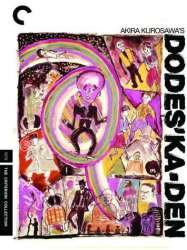 , 33minutes
, 33minutesOrigin Japon
Genres Documentary
Themes Films about films, Documentary films about the film industry
Actors Bokuzen Hidari, Kyōko Kagawa, Takeshi Katō, Akira Kurosawa, Toshiro Mifune, Yoshirō Muraki
Roles lui-même
Rating68%





Ce documentaire décrit la façon dont Akira Kurosawa et son équipe ont travaillé sur un de ses films les plus célèbres, Les Sept Samouraïs.
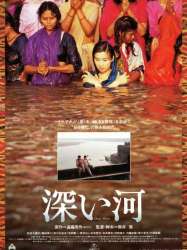
Deep River (1995)
, 2h10Directed by Kei Kumai
Genres Drama
Actors Kumiko Akiyoshi, Eiji Okuda, Hisashi Igawa, Kyōko Kagawa, Toshiro Mifune, Kin Sugai
Roles Tsukada
Rating75%





Un groupe de touristes japonais tente d'oublier son passé et se retrouve en Inde. Basé sur le roman d'Endo Shusaku.
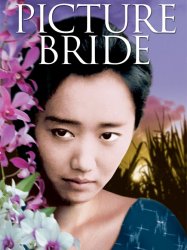
Picture Bride (1995)
, 1h35Origin USA
Genres Drama, Historical, Romance
Themes Seafaring films, Transport films
Actors Yūki Kudō, Tamlyn Tomita, Cary-Hiroyuki Tagawa, Toshiro Mifune, Yōko Sugi, Jason Scott Lee
Roles The Benshi
Rating65%





The film is set in 1918. Riyo (Kudoh) is a "city girl", who becomes a picture bride to a man who works as a field hand on a sugar cane plantation in Hawaii. The film begins with the death of Riyo's father, which leads Riyo's aunt to make arrangements for Riyo to become a picture bride. As Riyo prepares to be photographed, her aunt shows her a picture of the handsome Matsuji (Takayama), her husband-to-be in Hawaii. Not only is the photo intended as introduction, but also as a means of confirming that each has found the right partner when they meet for the first time on the docks. However, when Riyo finally arrives in Honolulu, the man who comes to greet her looks nothing like the man in the photo. Matsuji confesses that the photo he sent was old, taken when he was a young man.
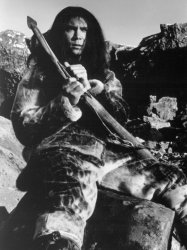
Shadow of the Wolf (1992)
Directed by Jacques Dorfmann
Origin France
Genres Drama, Thriller, Adventure
Actors Lou Diamond Phillips, Toshiro Mifune, Jennifer Tilly, Bernard-Pierre Donnadieu, Donald Sutherland, Nicholas Campbell
Roles Kroomak
Rating58%





Agaguk s'est isolé de la tribu de son peuple Inuit, car il a été renié par son père, le chaman Kroomak, pour avoir contesté la femme que ce dernier avait choisi. Meurtrier de Brown, un homme blanc venu faire du négoce, il est poursuivi par la police des Blancs, menaçant la tribu entière d'expropriation.

Death of a Tea Master (1989)
, 1h47Directed by Kei Kumai
Origin Japon
Genres Drama, Historical
Themes Seafaring films, Transport films
Actors Eiji Okuda, Toshiro Mifune, Taketoshi Naito, Kinnosuke Nakamura, Gō Katō, Shinsuke Ashida
Roles Rikyu Sen-no
Rating68%





Adaptation du roman Le Maître de thé de Yasushi Inoue (1981).
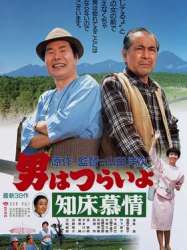
Tora-san Goes North (1987)
, 1h47Directed by Yōji Yamada
Genres Drama, Comedy
Themes Seafaring films, Transport films
Actors Kiyoshi Atsumi, Toshiro Mifune, Chieko Baishō, Masami Shimojō, Keiko Awaji, Keiko Takeshita
Roles Junkichi Ueno
Rating69%





When his travels take him to rural Hokkaido, Tora-san helps a cantankerous old veterinarian (Mifune) in his relationships with his estranged daughter, and a woman in whom he is secretly interested.

Princess from the Moon (1987)
, 2h1Directed by Kon Ichikawa
Genres Drama, Science fiction, Fantasy, Adventure
Themes Children's films
Actors Toshiro Mifune, Ayako Wakao, Yasuko Sawaguchi, Kōji Ishizaka, Kiichi Nakai, Megumi Odaka
Roles Taketori-no-Miyatsuko
Rating62%





One day wood cutter Taketori-no-Miyatsuko (Toshiro Mifune) discovers a baby girl while he's out in the forest visiting his daughter's grave. Not wanting to leave the infant to die and because of her resemblance to his dead daughter, he takes the child home with him- only to discover that the child grows at an extraordinarily fast rate. Incredibly beautiful, the now grown child Kaya (Yasuko Sawaguchi) attracts the attention of everyone around her, including the land's Emperor. Unwilling to accept their advances, Kaya gives the men a list of increasingly difficult tasks. By the film's end Kaya returns to outer-space by way of a space ship.
 , 2h13
, 2h13Directed by Toshiya Fujita
Genres Drama, Action, Crime
Actors Saburō Tokitō, Miwako Fujitani, Kunie Tanaka, Yoshio Harada, Toshiro Mifune
Roles Fisherman
Rating63%





Joe Petrel (Umitsubame Joe) is a half-Filipino, half-Okinawan gangster who escapes to the Philippines after killing a mob boss. The film chronicles his misadventures with underworld characters and the police.

Theater Of Life (1983)
, 2h18Directed by Kinji Fukasaku, Jun'ya Satō, Sadao Nakajima
Genres Drama
Actors Keiko Matsuzaka, Toshiyuki Nagashima, Kie Nakai, Hiroki Matsukata, Hideo Murota, Morio Kazama
Rating66%






The Challenge (1982)
, 1h53Directed by John Frankenheimer
Origin USA
Genres Drama, Science fiction, Action
Themes Seafaring films, Transport films
Actors Scott Glenn, Toshiro Mifune, Kenta Fukasaku, Donna Kei Benz, Atsuo Nakamura, Calvin Jung
Roles Toru Yoshida
Rating61%





The sword (one of a pair known as "The Equals") was a family heirloom, passed down through the generations, and had been lost during World War II. It was finally tracked down in California where Yoshiida's son, Toshio, finds it. He looks for someone to hire to act as a decoy in order to safely smuggle it into Japan, and back to its rightful owner, Yoshida-san. Rick Murphy (Scott Glenn) is contracted to smuggle a rare sword into Japan, only to find upon his arrival that it is a fake. Aggravated that he has been used as a decoy, he is faced with the prospect of being killed by Yoshida-san's (Toshirō Mifune) brother, Hideo. Instead, he is advised to infiltrate Yoshida's martial arts school and obtain the sword. He does so, yet finds himself being drawn into the ways of Japanese etiquette and tradition to the point where he returns the sword to Yoshida himself after having the perfect opportunity to escape with it. Murphy then humbly asks Yoshida-san if he can be forgiven and taken back in because he wants to learn the ways of Bushido. Yoshida agrees, but only if Murphy follows Yoshida's conditions.
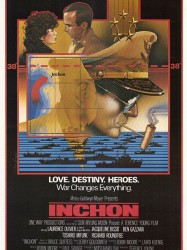
Inchon (1982)
, 1h45Directed by Terence Young
Origin USA
Genres Drama, War, Historical
Themes Politique, Political films
Actors Laurence Olivier, Jacqueline Bisset, Ben Gazzara, Toshiro Mifune, Richard Roundtree, David Janssen
Roles Saito-San
Rating28%





The film depicts the Battle of Inchon during the Korean War, which took place September 15–19, 1950 and is considered the turning point of the war. The protagonist of the film is General Douglas MacArthur (Laurence Olivier), who led the United States surprise amphibious landing at Incheon in 1950. A subplot in the film involves an American couple who encounter difficulties in their relationship because of the ongoing war.
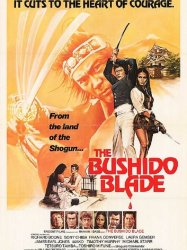
The Bushido Blade (1981)
, 1h44Genres Drama, Action, Historical
Themes Seafaring films, Sports films, Transport films, Martial arts films, Samurai films
Actors Sonny Chiba, Richard Boone, Frank Converse, Laura Gemser, James Earl Jones, Mako Iwamatsu
Roles Shogun's Commander
Rating53%





The basic plot concept bears a strong similarity to the earlier movie Red Sun (1971), also featuring Toshiro Mifune.
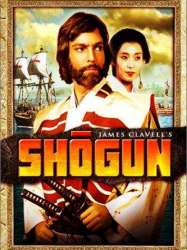
Shōgun (miniseries) (1980)
, 9h7Directed by Jerry London
Origin USA
Genres Drama, Adventure, Historical
Themes Seafaring films, Transport films
Actors Richard Chamberlain, Toshiro Mifune, Yōko Shimada, Damien Thomas, John Rhys-Davies, Michael Hordern
Roles Yoshi Toranaga, Lord of the Kwanto
Rating81%





After his Dutch trading ship Erasmus and its surviving crew is blown ashore by a violent storm at Injiro on the east coast of Japan, Pilot-Major John Blackthorne, the ship's English navigator, is taken prisoner by samurai warriors. When he is later temporarily released, he must juggle his self-identity as an Englishman associated with other Europeans in Japan, namely Portuguese traders and Jesuit priests, with the alien Japanese culture into which he has been thrust and now must adapt to in order to survive. Being an Englishman, Blackthorne is at both religious and political odds with his enemy, the Portuguese, and the Catholic Church's Jesuit order. The Catholic foothold in Japan puts Blackthorne, a Protestant and therefore a heretic, at a political disadvantage. But this same situation also brings him to the attention of the influential Lord Toranaga, who mistrusts this foreign religion now spreading in Japan. He is competing with other samurai warlords of similar high-born rank, among them Catholic converts, for the very powerful position of Shōgun, the military governor of Japan.

1941 (1979)
, 1h58Directed by Steven Spielberg
Origin USA
Genres War, Comedy, Action
Themes Military humor in film, Seafaring films, Christmas films, Transport films, Political films, United States Armed Forces in films
Actors Dan Aykroyd, Ned Beatty, John Belushi, Lorraine Gary, Murray Hamilton, Christopher Lee
Roles Cmdr. Akiro Mitamura
Rating58%





On Saturday, December 13, 1941 at 7:01 a.m., a woman goes swimming somewhere on the California coast, only to find a Japanese submarine surfacing beneath her. The submarine crew believes they have arrived in Hollywood, and the vessel submerges while the woman swims to safety.
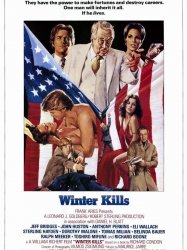
Winter Kills (1979)
, 1h37Directed by William Richert
Origin USA
Genres Drama, Thriller, Comedy-drama
Themes Political films
Actors Jeff Bridges, John Huston, Anthony Perkins, Eli Wallach, Sterling Hayden, Dorothy Malone
Roles Keith
Rating61%





Nick Kegan (Bridges) is the son of world-famous tycoon Pa Kegan (Huston) and the younger half-brother of the late President Timothy Kegan, who was slain by a lone sniper 19 years earlier. When an ex-convict named Arthur Fletcher (Joe Spinell) makes a deathbed confession to Nick, claiming that he was the second of two riflemen who shot the president and was sub-contracted by an unknown agency, Nick sets off on a quest to discover the truth about his late brother's murder.
 Connection
Connection
